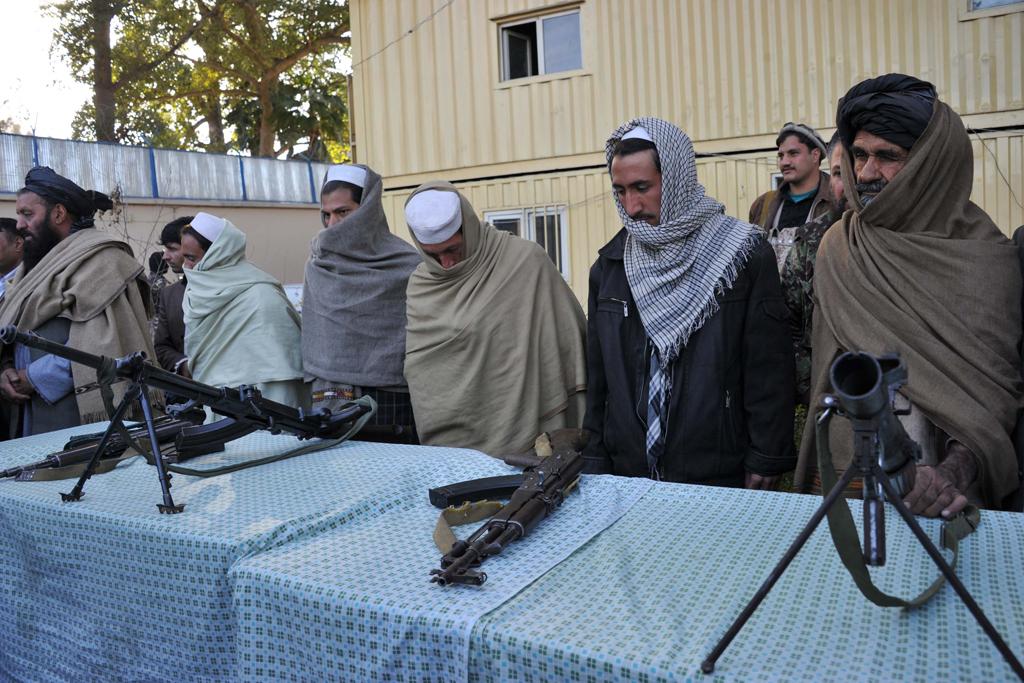Afghanistan transition: One city is a ticking time bomb
Former Taliban fighters stand next to their weapons as they join a peace and reconciliation process at a ceremony in Jalalabad, Afghanistan, on Jan. 13, 2013. As the capital of Nangarhar province, Jalalabad is one of the most important economic and political centers in the eastern part of the country.
JALALABAD, Afghanistan — The evening prayer had just finished when an imam at a mosque in this city in eastern Afghanistan turned his attention to politics.
Over a loudspeaker, he told worshippers that people who fight for Islam and die as martyrs are rewarded in paradise. Americans are "pigs" and "brutal animals," he said.
For years Jalalabad has been relatively untouched by the war raging elsewhere in the country. On the surface it is still a thriving commercial center where visitors come to take weekend breaks, eat fish and enjoy the mild winter weather.
But now there is a darker undercurrent to life here. Anti-NATO sentiment is easily found alongside anxiety over what will happen when the foreign troops leave.
The violence that is prevalent in other parts of the country has also begun to bleed into the streets — adding to an atmosphere that feels like the calm before the storm.
"This is a revolution," said Haji Nazer Gul, a local shopkeeper and father of nine. "One kilometer from the city the government does not have control."
If Jalalabad is ever lost, US hopes for a stable post-occupation Afghanistan will surely have been dealt a fatal blow.
The city lies a short distance from the Khyber Pass and the Pakistan border. As the capital of Nangarhar province, it is the most important economic and political hub in the east of the country and a place that resonates with deep historical symbolism.
In 1842, William Brydon, an assistant surgeon of the British East India Company Army, arrived here slumped on his dying horse — a rare survivor in a catastrophic retreat by the British Empire at the end of the first Anglo-Afghan war.
Then in the communist era, Jalalabad was the site of a major battle between the government and the mujahedeen after the Soviets withdrew. Osama bin Laden took part in the fighting, which ended in failure for the guerrillas.
The former Al Qaeda leader later lived here for a brief period in the 1990s and took refuge in the nearby Tora Bora mountains, following the 2001 US-led invasion.
During a recent visit by GlobalPost, Afghan soldiers could be seen trying to remove a bomb from the main highway connecting Kabul to Jalalabad. The device was made out of a gas cylinder with an accompanying detonation cord.
Rasul Ullah Rafiee, the deputy leader of the local branch of Jamiat Eslah, an Islamist civil society group active across the country, claims “everyone is worried” security will deteriorate further.
"Without the Americans the [Afghan] army is nothing,” he said, before adding that the Taliban are already “in power indirectly.”
US President Barack Obama and Afghan President Hamid Karzai agreed last week to speed up the transition process. Afghan forces will now take the lead in combat operations this spring, rather than in the summer as originally planned.
Still no decision has been made on whether any US troops will stay beyond the end of 2014 — the deadline for withdrawal.
According to a number of residents interviewed for this article, kidnappings have become common in Jalalabad and wealthy businessmen are often the targets. Rafiee blamed the abductions on criminals rather than insurgents, but acknowledged the militants are openly active in many rural areas.
He listed the names of five districts in Nangarhar that are notorious for being unsafe.
"The lives of the people in these places are very bad. I do not just mean those who work with the government, I mean all of them. They cannot go out of their houses at night even at prayer time," he said.
The Taliban's presence in Jalalabad itself is less obvious. However, guerrillas appear to be operating inside the city, quietly influencing events from the shadows.
Music shops selling the latest recordings of Pashtun singers from both sides of the border used to be a common sight here. Today they are difficult to find because, since 2010, the owners have been threatened and driven out.
High-profile attacks also occasionally take place. The most recent of these happened last month when a group of militants carried out a coordinated assault on Jalalabad airport, where US and Afghan troops are stationed.
More from GlobalPost: 2012 was a tough year for Afghanistan. 2013 will be tougher
Support for the insurgents arises from a mixture of ideology, pragmatism and disillusionment. The governor of Nangarhar province is Gul Agha Sherzai, a former warlord, and local officials are widely perceived as corrupt.
Many of the rebels in this part of the country were once followers of Mawlawi Mohammad Yunus Khalis, a leader of the anti-Soviet resistance who died in 2006 having also opposed the current occupation.
His son, Anwar ul-Haq Mujahid, was freed from jail in Pakistan last November in an apparent attempt by Islamabad to help facilitate peace talks with the Taliban.
"Here is a man who spent years in jail without proof against him," said Mohammed Asif Samim, a local poet and writer. “Everyone is happy about this news, but not America.”
He told GlobalPost both the US and the Afghan people must share the blame for the uncertain situation now facing the country.
“America did not ask us to enter and they will not ask us to leave,” he said. “They just care about their own interests.”
Fazelminallah Qazizai reported from Jalalabad and Chris Sands reported from Kabul.
We want to hear your feedback so we can keep improving our website, theworld.org. Please fill out this quick survey and let us know your thoughts (your answers will be anonymous). Thanks for your time!
